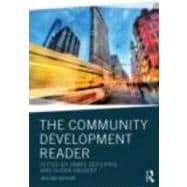
Note: Supplemental materials are not guaranteed with Rental or Used book purchases.
Purchase Benefits
What is included with this book?
| List of illustrations | p. ix |
| Preface | p. xi |
| Acknowledgments | p. xiii |
| Notes on the text | p. xiv |
| Communities Develop: The Question is, How? | p. 1 |
| History and Future of Community Development | |
| Swimming against the Tide: A Brief History of Federal Policy in Poor Communities | p. 11 |
| Community Control and Development: The Long View | p. 30 |
| Refraining Community Practice for the 21st Century: Multiple Traditions, Multiple Challenges | p. 38 |
| Community Development Institutions and Practice | |
| Introduction to Part II | p. 51 |
| More than Bricks and Sticks: Five Components of Community Development Corporation Capacity | p. 54 |
| Learning from Adversity: The CDC School of Hard Knocks | p. 70 |
| Social Housing | p. 75 |
| Community Response to Foreclosure | p. 90 |
| Community Development Financial Institutions: Expanding Access to Capital in Under-Served Markets | p. 99 |
| The Economic Development of Neighborhoods and Localities | p. 107 |
| Conceptual Overview of What We Know about Social Entrepreneurship | p. 117 |
| Communities as Place, Face, and Space: Provision of Services to Poor, Urban Children and their Families | p. 125 |
| Connecting Public Schools to Community Development | p. 134 |
| Capacity Building: The Case of Faith-based Organizations | p. 140 |
| Toward Greater Effectiveness in Community Change: Challenges and Responses for Philanthropy | p. 150 |
| City Government's Role in the Community Development System | p. 158 |
| Diverse Food Economies, Multivariant Capitalism, and the Community Dynamic Shaping Contemporary Food Systems | p. 157 |
| Sustainability in Community Development | p. 175 |
| Building and Organizing Community | |
| Introduction to Part III | p. 187 |
| History Matters: Canons, Anti-Canons and Critical Lessons from the Past | p. 191 |
| Community Organizing or Organizing Community? Gender and the Crafts of Empowerment | p. 201 |
| Community Building: Limitations and Promise | p. 209 |
| Building Civic Capacity in Urban Neighborhoods: An Empirically Grounded Anatomy | p. 220 |
| How Does Community Matter for Community Organizing? | p. 228 |
| Doing Democracy Up Close: Culture, Power, and Communication in Community Planning | p. 237 |
| Community Organizing for Power and Democracy: Lessons Learned from a Life in the Trenches | p. 244 |
| Globalization and Community Development | |
| Introduction to Part IV | p. 251 |
| Globalization and Free Trade | p. 253 |
| Post-Industrial Widgets: Capital Flows and the Production of the Urban | p. 262 |
| Community-based Organizations and Migration in New York City | p. 270 |
| Migrant Hometown Associations and Opportunities for Development: A Global Perspective | p. 280 |
| Global Corporations, Global Campaigns: The Struggle for Justice at Kukdong International in Mexico | p. 286 |
| The International Roots of Microenterprise Development | p. 293 |
| Theoretical Conceptions and Debates | |
| Introduction to Part V | p. 305 |
| What Community Supplies | p. 308 |
| Development as Capability Expansion | p. 319 |
| Five Faces of Oppression | p. 328 |
| Defining Feminist Community: Place, Choice, and the Urban Politics of Difference | p. 338 |
| Privileged Places: Race, Opportunity, and Uneven Development in Urban America | p. 347 |
| Domestic Property interests as a Seedbed for Community Action | p. 353 |
| The CDC Model of Urban Development: A Critique and an Alternative | p. 361 |
| Strengthening the Connections between Communities and External Resources | p. 369 |
| Concluding Thoughts | p. 377 |
| Index | p. 383 |
| Table of Contents provided by Ingram. All Rights Reserved. |
The New copy of this book will include any supplemental materials advertised. Please check the title of the book to determine if it should include any access cards, study guides, lab manuals, CDs, etc.
The Used, Rental and eBook copies of this book are not guaranteed to include any supplemental materials. Typically, only the book itself is included. This is true even if the title states it includes any access cards, study guides, lab manuals, CDs, etc.